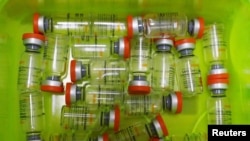The highly contagious delta variant of the coronavirus is rapidly spreading in Southeast Asia as concerns mount over the efficacy of China’s Sinovac Biotech vaccine, which has been used in several countries in the region.
Questions over the effectiveness of Beijing’s vaccine have prompted some governments, including Thailand’s, to consider giving people vaccinated with the Sinovac CoronaVac a booster shot, this time from another vaccine manufacturer such as AstraZeneca.
Sinovac is one of seven coronavirus vaccines that have received emergency use approval by the World Health Organization. Studies on the efficacy rate are ongoing, but Sinovac appears to be less powerful against the virus than other COVID-19 vaccines.
In Indonesia, the majority of vaccine doses offered so far — nearly 90% — have been made by Sinovac.
Concerns about Sinovac have made some Indonesians hesitant to receive the shot. One-third of residents in the province of Jakarta said they are still undecided about whether to be vaccinated, according to a recent poll.
Ismayanti, 25, of Jakarta, told VOA that she is interested in getting vaccinated, but not with the Sinovac vaccine.
"From the start, I was doubtful. Because [the World Health Organization] didn't immediately support or admit that Sinovac was effective. I still don't want to use it. Moreover, there are many doctors who died of COVID even though they had been fully vaccinated with Sinovac,” Ismayanti said.
The Indonesian Medical Association said last month at least 10 doctors who were fully vaccinated with two doses of the vaccine have died.
Wahyu Jaya, a 30-year-old employee in Jakarta, told VOA, "If it's not that effective, why would I want to put it in my body? And since I've experienced COVID symptoms and the antigen test came back positive, I want to be sure. I'm ready to receive the vaccine, but, if possible, not this Sinovac."
Indonesia, the world’s fourth most populous country, with more than 275 million people, has recorded more than 2.67 million cases of COVID-19 and 69,210 deaths, according to the Johns Hopkins Coronavirus Resource Center. The country has administered more than 52 million vaccine doses, according to Johns Hopkins.
‘Not the time to be picky’
Septi Diah, a 28-year-old employee in Jakarta who has been vaccinated, said she does not doubt Sinovac’s efficacy.
"Since the beginning of the pandemic, I had really wanted to be vaccinated, no longer thinking about which manufacturer or what brand the vaccine is from … because we are in an unusual situation. So, in my opinion, now is not the time to be picky," Septi said.
Ray Indra, 34, a small-business owner in Jakarta, echoed the sentiment.
"Basically, I have no problem using any vaccine, because previously my wife was vaccinated using AstraZeneca and saw the side effects,” Ray said. “After that, I was vaccinated with Sinovac independently... Even though there are friends who have been vaccinated twice with Sinovac, they still get COVID-19, but the symptoms are not like those who were not vaccinated.”
Before the recent surge in COVID-19 cases in Indonesia, a study among Indonesian health workers in May showed that Sinovac’s vaccine could reduce the risk of developing symptomatic COVID-19 by 94% and that it was 96% effective in reducing the risk of having to be hospitalized.
Sinovac, and another Chinese vaccine maker, Sinopharm, have said they are studying how well their vaccines work against the delta variant, but have yet to release any data, according to The Wall Street Journal.
Overall, little peer-reviewed data on the Sinovac vaccine are available. What information is available suggests that the vaccine is less potent than other COVID-19 vaccines, though it still gives users significant protection.
In June, the government of Uruguay released data showing Sinovac reduced COVID-19 infections by 61%, hospitalizations by 92% and deaths by 95%.
The New England Journal of Medicine published a study in early July that used results from a mass vaccination campaign that began in February in Chile. The study results showed Sinovac reduced COVID-19 infections by 65.9%, is 87.5% effective at preventing hospitalizations and 86.3% effective at preventing deaths.
In comparison, the WHO says the Pfizer vaccine is 95% effective at preventing symptomatic infection and the Moderna vaccine is 94% effective.
Public Health England said last month its analysis of how well the vaccines work against the delta variant suggests the Pfizer shot is 96% effective against cases severe enough to require hospitalization, compared to 92% for the AstraZeneca vaccine.
In Cambodia, Sinovac doses represent a much smaller proportion of the vaccination effort than in Indonesia, but are still a major part of the campaign that has given at least one dose of a vaccine to about 5 million people.
Health Ministry Secretary of State Or Vandine told VOA Khmer that vaccines used in Cambodia’s mass vaccination drive – Sinovac, Sinopharm and AstraZeneca – were effective in preventing severe illness and death, but that fully vaccinated people still needed to observe COVID-19 measures, like mask wearing and social distancing.
Chea Phenghour, 21, a third year student of civil engineering at Norton University in Phnom Penh, said he was vaccinated with two doses of Sinovac in early June, though he is unsure about the efficacy level.
“I don’t know exactly the efficacy,” he said. “But I don’t strongly rely on vaccines. I have to be careful by myself. If we freely go out in the gathering, vaccines can’t help fight [the virus].”
Sinovac vaccine doses have also been a big part of the COVID-19 vaccination efforts in the Philippines and Thailand, but both countries have also relied on a significant portion of doses from other manufacturers such as Pfizer and AstraZeneca.
Indra Yoga, Sun Narin, Aun Chhengpor, Steve Baragona, Luke Hunt contributed to this report.
Some information for this report came from the Associated Press and Reuters.





